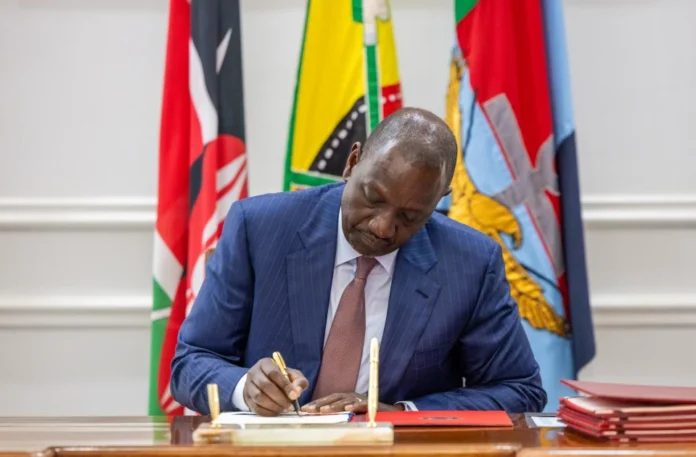President William Ruto has assented to two landmark pieces of legislation, the Conflict of Interest Bill, 2023, and the Social Protection Bill, 2025, in a significant step toward reinforcing public sector integrity and expanding social safety nets for Kenya’s vulnerable populations.
The signing ceremony, held Wednesday at State House Nairobi, was attended by senior government officials, including National Assembly Majority Leader Kimani Ichung’wah, who sponsored both bills.
The Conflict of Interest Bill, 2023 seeks to establish a unified legal framework to prevent and manage conflicts of interest in public service. The law repeals the existing Public Officer Ethics Act (Cap. 185B) and introduces stringent regulations aimed at curbing unethical practices among public officers.
The Ethics and Anti-Corruption Commission (EACC) has been granted principal oversight authority, aligning with its constitutional role under Article 79. EACC will be responsible for enforcing compliance, supervising implementation, and investigating violations.
Key provisions of the bill include:
- Prohibitions against public officers using their positions for personal gain or granting undue advantage to others.
- Restrictions on engaging in business contracts with government entities or acquiring interests in companies contracting with the officer’s institution.
- Mandatory recusal from decision-making where a personal interest exists.
- Bans on accepting external employment offers that may influence official duties.
- Requirement to declare income, assets, and liabilities — including those of spouses and dependent children.
“This bill is a powerful tool to restore trust in public institutions and ensure that public service remains a duty, not a platform for self-enrichment,” said Ichung’wah.
The Social Protection Bill, 2025 introduces a comprehensive, rights-based framework for safeguarding the welfare of disadvantaged Kenyans throughout their life cycle — from childhood to old age.
The legislation establishes a non-contributory social protection system, enabling eligible individuals to access government support without financial input. A new National Board for Social Protection, chaired by a presidential appointee and composed of representatives from government, counties, and civil society, will oversee programme implementation, monitoring, and policy coordination.
Programmes under the new framework include:
- Cash transfers to vulnerable populations
- Feeding programmes and psychosocial care
- Provision of assistive devices for persons with disabilities
Counties are mandated to enact localized strategies in alignment with national policy, maintain updated registries of vulnerable persons, and allocate resources accordingly.
Those eligible for assistance include orphans and vulnerable children, persons with disabilities, older persons living in poverty, individuals affected by disasters, and unpaid or unsupported caregivers. The Cabinet Secretary for Social Protection retains discretion to expand this list to address emerging needs.
Beneficiaries will go through a formal registration and assessment process. If an application is rejected, applicants have the right to seek a review and appeal to the Cabinet Secretary or the High Court within 30 days.
Funding will be channeled through a newly established Social Protection Fund, to be administered by the National Treasury.
President Ruto lauded the enactment of the two laws as pivotal in his administration’s quest for ethical governance and inclusive development.
“These laws reflect our commitment to restoring integrity in public service and ensuring that no Kenyan is left behind in accessing essential social protection,” he stated.
The twin laws are expected to significantly strengthen Kenya’s anti-corruption infrastructure while ensuring a more just and compassionate society for all.
Written By Rodney Mbua



















